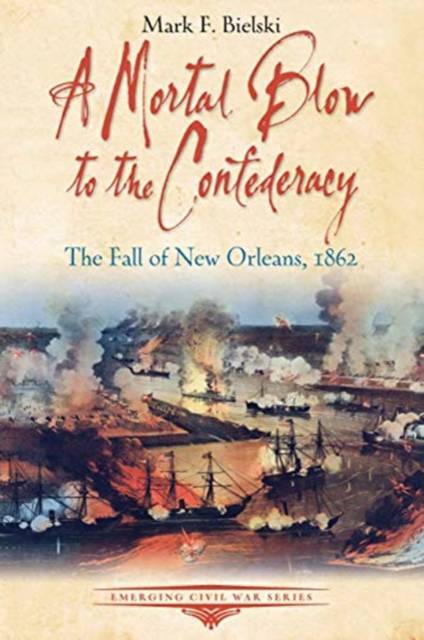
- Afhalen na 1 uur in een winkel met voorraad
- Gratis thuislevering in België vanaf € 30
- Ruim aanbod met 7 miljoen producten
- Afhalen na 1 uur in een winkel met voorraad
- Gratis thuislevering in België vanaf € 30
- Ruim aanbod met 7 miljoen producten
Zoeken
Omschrijving
Abraham Lincoln knew if the Union could cut off shipping to and from New Orleans, the largest exporting port in the world, and control the Mississippi River, it would be a mortal blow to the Confederate economy. Union military leaders devised a secret plan to attack the city from the Gulf of Mexico with a formidable naval flotilla under one commander, David G. Farragut, a native New Orleanian.
Jefferson Davis also understood the city's importance--but he and his military leaders remained steadfastly undecided about where the threat to the city lay, sending troops to Tennessee rather than addressing the Union forces amassing in the Gulf. In the city, Confederate General Mansfield Lovell, a new commander, was thrust into the middle and poised to become a scapegoat. He was hamstrung by conflicting orders from Richmond and lacked both proper seagoing reconnaissance and the unity of command.
In the spring of 1862, when a furious naval battle began downriver from the city at Forts Jackson and St. Philip, the joyous celebrations of Mardi Gras turned into the Easter season of dread as the sound of the distant bombardment reached New Orleans, portending an ominous outcome.
History has not devoted a great deal of attention to the fall of New Orleans, a Civil War drama that was an early harbinger of the dark days to come for the Confederacy. In A Mortal Blow to the Confederacy: The Fall of New Orleans, 1862, historian Mark F. Bielski tells of the leaders and men who fought for control of New Orleans, the largest city in the South, the key to the Mississippi, and the commercial gateway for the Confederacy.
Jefferson Davis also understood the city's importance--but he and his military leaders remained steadfastly undecided about where the threat to the city lay, sending troops to Tennessee rather than addressing the Union forces amassing in the Gulf. In the city, Confederate General Mansfield Lovell, a new commander, was thrust into the middle and poised to become a scapegoat. He was hamstrung by conflicting orders from Richmond and lacked both proper seagoing reconnaissance and the unity of command.
In the spring of 1862, when a furious naval battle began downriver from the city at Forts Jackson and St. Philip, the joyous celebrations of Mardi Gras turned into the Easter season of dread as the sound of the distant bombardment reached New Orleans, portending an ominous outcome.
History has not devoted a great deal of attention to the fall of New Orleans, a Civil War drama that was an early harbinger of the dark days to come for the Confederacy. In A Mortal Blow to the Confederacy: The Fall of New Orleans, 1862, historian Mark F. Bielski tells of the leaders and men who fought for control of New Orleans, the largest city in the South, the key to the Mississippi, and the commercial gateway for the Confederacy.
Specificaties
Betrokkenen
- Auteur(s):
- Uitgeverij:
Inhoud
- Aantal bladzijden:
- 192
- Taal:
- Engels
- Reeks:
Eigenschappen
- Productcode (EAN):
- 9781611214895
- Verschijningsdatum:
- 8/04/2021
- Uitvoering:
- Paperback
- Formaat:
- Trade paperback (VS)
- Afmetingen:
- 147 mm x 224 mm
- Gewicht:
- 317 g

Alleen bij Standaard Boekhandel
+ 33 punten op je klantenkaart van Standaard Boekhandel
Beoordelingen
We publiceren alleen reviews die voldoen aan de voorwaarden voor reviews. Bekijk onze voorwaarden voor reviews.











